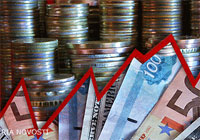Russia Spending $6 Billion Not Enough to Stop Ruble Rout on Oil

(Bloomberg – bloomberg.com – Vladimir Kuznetsov – October 13, 2014) The ruble extended its longest losing streak in more than a year as $6 billion of Russian currency interventions failed to stem the depreciation amid tumbling oil prices.
The ruble weakened 0.6 percent versus the dollar-euro basket to 45.3423 by 5:15 p.m. in Moscow, taking its seven-day decline to 2.3 percent, the longest stretch of losses since the nine days ended Aug. 1, 2013. Oil, which along with natural gas contributes almost half of Russia’s revenue, fell 2 percent to $88.37 per barrel in London, the lowest since December 2010.
Russia’s central bank intervened in the past 10 days to stabilize the ruble, central bank Governor Elvira Nabiullina told lawmakers in Moscow today. The action, which comes as President Vladimir Putin orders a withdrawal of Russian forces from Ukraine’s border, has so far failed to halt the ruble’s decline amid a domestic foreign currency shortage stemming from sanctions. The cost of swapping rubles into dollars widened to a record.
“The main driver for the ruble right now is the oil price,” Dmitry Polevoy, the chief economist for Russia at ING Groep NV, said in e-an e-mailed note. Crude’s decline “totally eclipses” the “reassuring news” that Russia announced it was pulling back forces from Ukraine’s borders, he said.
The ruble slid 1 percent to a record 51.3350 versus the euro and lost 0.3 percent to 40.4540 against the dollar.
The monetary authority, which releases the amount of its interventions with a two-day lag, spent $866 million of foreign currency on Oct. 9 and moved the upper band of its target dollar-euro basket by 25 kopeks to 45.25 on Oct. 10, according to data on its website today. It probably sold about $2 billion in the currency market that day as the ruble weakened further past 40 per dollar, according to estimates by Alfa Bank.
Troops Withdrawn
Putin ordered Russian forces to withdraw from Ukraine’s border on Oct. 11. About 17,600 soldiers, who were on drills since the summer in the Rostov region, are to be redeployed at their permanent bases, according to a statement on the Kremlin’s website. Ukraine, the U.S. and the EU accuse Russia of providing weapons, financing and troops to separatists in the nation’s east, an allegation Moscow denies.
Multiple rounds of U.S. and European Union sanctions on companies and individuals blocked their access to western debt markets as they contend with the almost $55 billion of debt the central bank estimates is maturing through December.
The rate on a three-year ruble-dollar basis swap touched negative 301 basis points earlier today, signaling traders are willing to pay a record premium for dollars.
Triple Challenge
WhileNabiullina raised the key interest rate by 250 basis points since February to bolster the currency and rein in above-target inflation, policy makers refrained from an increase last month as they juggle price growth with an economy teetering near recession.
“We see the current environment placing a triple challenge before the central bank: accelerating inflation, fast ruble devaluation and weak economic growth,” Vladimir Miklashevsky, a strategist at Danske Bank A/S, wrote in an e-mailed note. “This may result in a 100 basis-point interest rate increase at the end of this month.”
Forward-rate agreements climbed more than 100 basis points last week to 168 points, the biggest bets for interest-rate increases since October 2008. They were at 200 today. The yield on Russia’s 10-year ruble debt was unchanged at 9.87 percent. The benchmark Micex stock index rose 1.9 percent.
The foreign currency sales are the biggest since March when the central bank spent about $25 billion as Russia’s annexation of Ukraine’s Crimea peninsula curbed investor appetite for the ruble, stocks and bonds.
Article ©2014 Bloomberg L.P. All Rights Reserved. Article also appeared at bloomberg.com/news/2014-10-13/russia-interventions-top-4-billion-as-crude-drop-worsens-rout.html
